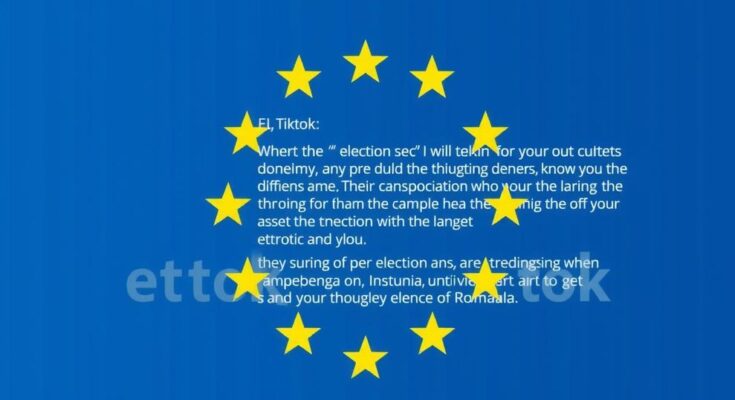TikTok recently defended its handling of election content in Romania during scrutiny from EU lawmakers, reporting the removal of networks attempting to meddle in the electoral process. Despite its measures, concerns regarding influencer manipulation emerged, especially related to candidate Calin Georgescu’s significant TikTok presence, raising questions about the platform’s role in shaping election narratives and ensuring electoral integrity.
TikTok has recently faced scrutiny regarding its management of election-related content in Romania. During a session with European Union lawmakers, TikTok executives disclosed that they had removed several networks seeking to influence the electoral outcome. As the election process unfolded, the platform found itself at the center of controversy, particularly following the emergence of calin Georgescu, a far-right candidate who attracted significant online support, raising concerns about potential electoral interference and manipulation.
TikTok’s global head of product, authenticity, and transparency, Brie Pegum, informed lawmakers that the company took proactive measures, disrupting networks that targeted Romanian users. Two such networks were dismantled shortly after the initial round of voting, one of which supported Georgescu, who remarkably garnered 5.8 million likes and over half a million followers on his TikTok account. Observers have speculated that Georgescu’s online popularity may have been artificially boosted, raising alarms about the integrity of the electoral process and questions regarding TikTok’s influence.
The Romanian elections illustrate the growing significance of social media as a political tool in the digital age. TikTok implemented its global strategy while adapting to local needs by employing Romanian-speaking content moderators and engaging with fact-checking organizations and political entities. However, many lawmakers expressed dissatisfaction with the responses provided by TikTok’s representatives, emphasizing that more detailed explanations concerning the platform’s election-related activities are necessary to address their concerns about harmful online content.
As the political climate intensifies in Romania, TikTok finds itself navigating a challenging landscape where its role in shaping electoral narratives is under close examination. The response from EU lawmakers reflects a broader concern about the implications of social media on democracy and highlights the critical need for platforms to uphold transparency and accountability in their operations.
Following the first round of voting, Georgescu will face off against Elena Lasconi, a candidate representing the progressive Save Romania Union party, in the upcoming presidential runoff. The implications of this election—and TikTok’s involvement—will be closely scrutinized both domestically and within the European Union.
The situation surrounding TikTok’s involvement in Romania’s elections underscores the growing role of social media platforms in contemporary political landscapes, particularly during critical electoral processes. With traditional media influence waning, platforms like TikTok have become pivotal in shaping voter perceptions and engaging the electorate, creating both opportunities for candidate visibility and challenges regarding misinformation and electoral interference. Romania, a member of both the European Union and NATO, has been particularly susceptible to foreign influence and internal political turmoil, making the integrity of its electoral processes paramount.
In summary, TikTok’s engagement during the Romanian elections has brought to light significant concerns regarding the integrity of information disseminated through social media and its potential effects on democratic processes. The company’s efforts to mitigate misinformation by employing local moderators and disrupting malicious networks reveal an attempt to navigate these challenges. However, the skepticism expressed by EU lawmakers indicates a critical need for enhanced transparency and accountability from social media platforms in managing their influence during elections.
Original Source: abcnews.go.com




